May / June Fieldwork Update
Project Phoebe’s field season has now passed its busiest point — late May / early June, when most of our Phoebe pairs (a male and a female that raise young together) are caring for their chicks. So far this season, we have been tracking the activity and success of 56 Phoebe pairs, many of whom returned from last year.


Many of these pairs have raised not only one but two successful broods of baby Phoebes! Of the 76 completed nesting attempts we’ve monitored for our pairs, 40 have resulted in young Phoebes that successfully leave the nest. Unfortunately, not all pairs are so lucky–36 nesting attempts have ultimately failed at some stage. The biggest challenges to breeding Phoebes seem to include nest predators such as California Scrub Jays, which eat eggs and nestlings, structural failure of nests, and exposure to extreme temperatures (cold or hot). Some nests fail for no obvious reason–in these cases, an unseen factor, such as chemical pollution, may be the driver. Our team is currently busy at work trying to unravel which Phoebe pairs are most at risk, how they cope with these challenges, and what we can do to help them.
Behavior is the front line of an animal’s interaction with the environment, so it is likely to be important in understanding how animals like Phoebes cope with threats, from predators to heat. One question our team seeks to answer is whether Phoebe parents can adjust their behavior to shield their chicks from danger. When Phoebe chicks hatch, they are tiny, featherless, and completely dependent on their parents for several weeks. Can Phoebe parents defend their nest more aggressively to fend off interlopers or predators? Can they bring more food to give chicks the energy they need to live through heat waves? We are busy deploying nest cameras to record our Phoebe parents hard at work.
Stay tuned for more updates! 🙂
– Sage



Hi, I met your group in Chestnut Park a few weeks ago. Our backyard faces the park.
Is there a way we can watch the webcam?
Hi! Thanks for reaching out. We don’t have a livestream from our cameras, unfortunately– I am not that tech savvy, haha. That said, if you shoot me an email at saamadden@ucdavis.edu, I can send you some clips from the Chestnut Park nest!
Sage